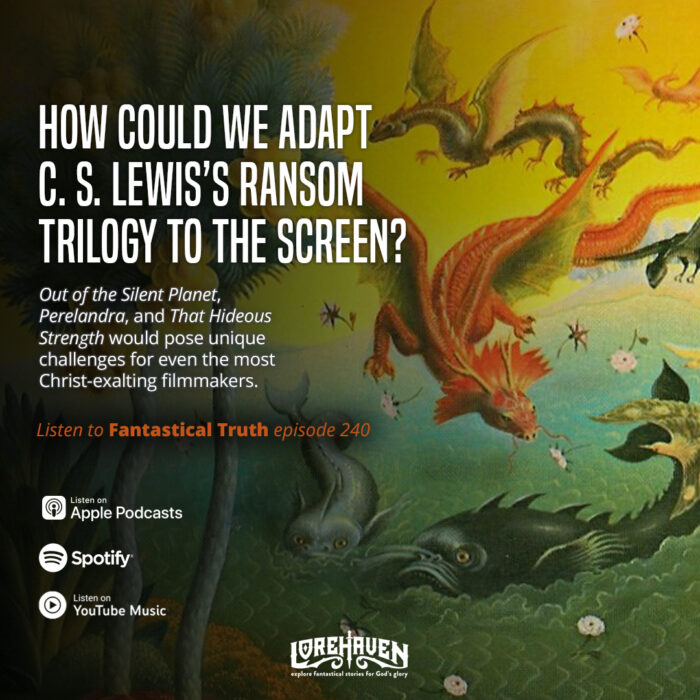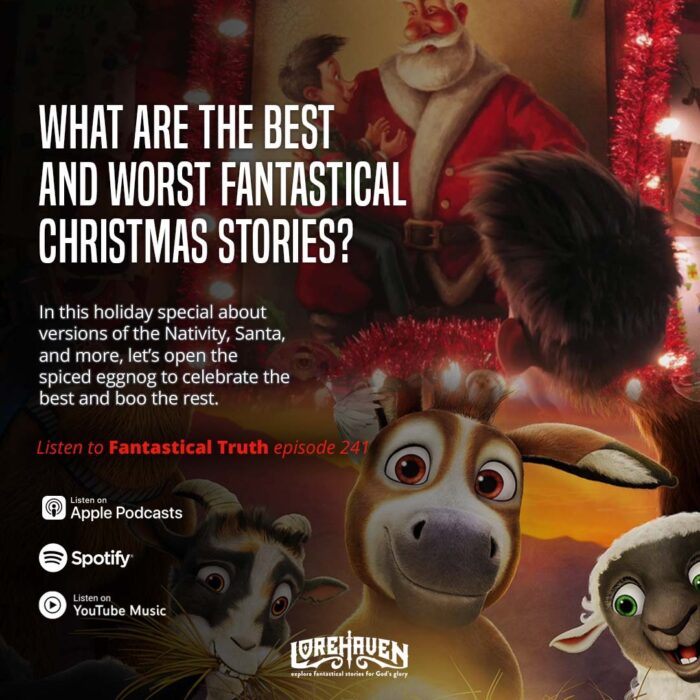241. What Are the Best and Worst Fantastical Christmas Stories?
Podcast: Play in new window | Download (Duration: 1:10:27 — 65.8MB) | Embed
‘Tis the season for Christmas stories and stories fans claim are Christmas stories. Which ones have aged for every season? And which ones could be safely left back in childhood when we thought they were fun? In this special episode, let’s open the spiced eggnog, celebrate the best, and boo the rest.
Episode sponsors
- Enclave Publishing: Memoria by J. J. Fischer
- Laurie Christine: Garden of Mysteries: A Dragon Slayer Bible Story
- The Jabin Kainos series by Vince Mancuso
Mission update
- Lorehaven article: I Tried to Read the Original Wicked Book But Did Not Finish
- Lorehaven Onscreen: Dear Santa Presents Satan as Another Misunderstood Villain
- Subscribe free to get updates and join the Lorehaven Guild
1. Which are the best/worst Nativity adaptations?
- Netflix’s recent Mary film starts with a narration from their heroine:
- “You may think you know my story. Trust me, you don’t.” (Source.) Huh.
- Stephen prefers The Nativity Story and of course The Chosen specials.
- He grew up watching many Nativity adaptations from Christian creators.
- Zack is a fan of Sony Animation’s 2017 animated version The Star.
2. How do we like secular Christmas stories?
- Tales like How the Grinch Stole Christmas and Arthur Christmas count.
- So do “secular” stories that engage with faith, like It’s a Wonderful Life.
- Classics like Rudolph the Red-Nosed Reindeer have some surprising edge.
- For other films, like The Santa Clause (series) and Elf, mileage may vary.
3. What about ‘honorary’ Christmas stories?
- Fans argue for Die Hard and such-like, but Stephen really does not care.
- Similarly, does it matter that Iron Man 3 and Shazam occur at Christmas?
- None of these films, after all, actually released for the Christmas season.
- Stephen might claim The Hobbit, LOTR, and TLWW are Christmas tales.
Top question for listeners
- Which are your best and worst fantastical Christmas stories?
 Caden Gillon enjoyed last month’s episode 238 about dystopias:
Caden Gillon enjoyed last month’s episode 238 about dystopias:
Dystopia is an amazing genre, with so many facets to explore. When I heard episode # 238, I got really excited. Not to get off topic, but when I was younger, I devoured my way through the books The Hunger Games and the Divergent. Also, the movie The Book of Eli is a great example, where one character wants a Bible desperately for not-so-good intentions. Dystopia engages our minds in a way that makes us think ”wow, I’m glad it’s not like that right now in our society.” Many of us can agree on one thing, it’s an interesting topic, and has a meaning that can hit home if said in the right way.
When you read dystopia, as you guys said, it seems like everyone (except politicians) can relate to it. Man, early Christians dealt with dystopia in Rome, many countries do today (a good example, Tortured for Christ by Richard Wurmbrand). It’s a darkness that’s found in dictatorships and third world countries. I just wanted to say, and maybe you guys could mention this, we’re living in paradise here in North America. To respond to the question you guys placed in the episode name, I think dystopia is important for us in the way that it makes us realize where we are, and where we could be, and how we’re lucky it isn’t that way!
Remember this: Not to be pessimistic, but society isn’t always going to be the same. never take for granted the times we live in now!
Loving the podcast!
Caden Gillon.
The Adaptation Stationmaster doesn’t agree with Ransom Trilogy hype in episode 240:
with Ransom Trilogy hype in episode 240:
May I express a controversial opinion?
I think the Ransom books are the weakest works of fiction C. S. Lewis wrote. Out of the Silent Planet and Perelandra have some really good dialogue scenes (at the beginning of Silent Planet and in the middle of Perelandra) but a lot of them is just a bunch of description with hardly anything happening and, eh, I’ve read better descriptions by Lewis.
That Hideous Strength has a great cast of villains. I wish I could love the book as a whole. I’ve tried to love it. But I just find a lot of it clunky, especially the stuff with the heroes. And that’s a problem when a book is trying hard to convey how much better it is to be one of the heroes than the villains. To an unusual extent for Lewis, this book keeps telling me what to feel without making me feel it. It’s almost like he wrote an outline for a book.
I think something this podcast episode mentioned is very telling. That Hideous Strength is mostly popular with “theological dude bros” (Sorry, if I’m misremembering the phrase) e.g. people who already agree (broadly anyway) with C. S. Lewis’s perspective. The Chronicles of Narnia and Till We Have Faces can be enjoyed by readers even if they don’t totally agree with the worldview behind them. I can’t imagine, say, a feminist reading That Hideous Strength with anything other than disgust, never mind being converted by it. (If anyone knows or has heard of people who disagree with Lewis on the natural order of the world but still enjoy That Hideous Strength, I’d be really interested in hearing about them. I don’t mean that as a challenge; I honestly do think it would be really interesting.) Maybe the problem is that Lewis saw the poetic appeal of hierarchy so clearly and couldn’t see the poetic appeal of egalitarianism at all.
Having said all that, adapting the Ransom Trilogy makes infinitely more sense than Boxen. LOL.
Next on Fantastical Truth
What’s the most annoying slogan from Christian critics of fantasy? That may be, “We’re not meant to enjoy stories; instead we must Preach the Gospel.” But what may be the second most annoying slogan about Christian fantasy? One surely is, “We don’t need newer stories if we have Lewis and Tolkien.” How then can we as fans respond with grace to Lewis-and-Tolkien-Onlyism?































The makers of Arthur Christmas did not have this in mind, but the story really reminds me of these passages from 1 Corinthians.
God chose what is foolish in the world to shame the wise; God chose what is weak in the world to shame the strong; God chose what is low and despised in the world, even things that are not, to bring to nothing things that are.
If I speak in the tongues of men and of angels, but have not love, I am a noisy gong or a clanging cymbal. And if I have prophetic powers, and understand all mysteries and all knowledge, and if I have all faith, so as to remove mountains, but have not love, I am nothing. If I give away all I have, and if I deliver up my body to be burned, but have not love, I gain nothing.
Those interested in retellings of the Nativity story and how they keep incorporating the magi may be interested in this. When Dorothy Sayers wrote The Man Born to be King, her awesome radio drama of the life of Christ, she wanted to use the traditional Twelve Days of Christmas chronology with the magi showing up on the thirteenth day of Christ’s life on Earth, but she didn’t want to contradict Herod ordering the death of all boys in Bethlehem two years old and under, so she had him reason that the magi probably lied about the date the star appeared.